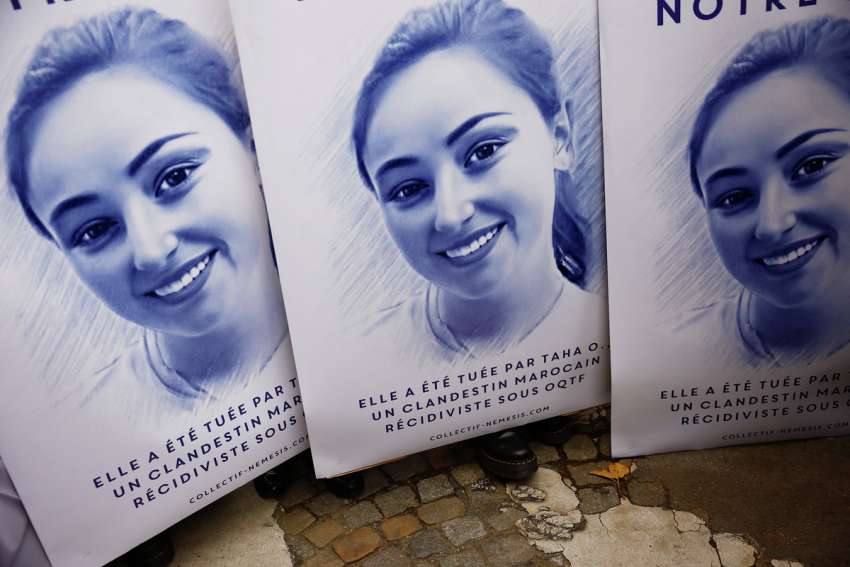The girl had disappeared the previous afternoon after leaving her university to spend the weekend with her family. Her body was found several hundred feet from the prestigious Dauphine University, where she was studying economics and finance.
Located on the west side of Paris, Bois de Boulogne is a large public park, two and a half times larger than New York's Central Park. Parisians love it for outdoor activities and family outings. But, especially in the evenings, parts of the park become very dangerous.
The young woman's death moved the entire country, and television channels broadcasted images of her coffin being brought into the Versailles cathedral. Philippine was a practicing Catholic, involved in her parish and in scouting. She helped lead the singing at Mass, took part in prayer evenings and attended her university's chaplaincy activities. Bishop Luc Crepy of Versailles, invited the whole diocese to join her family and fiancé in prayers.
Father Pierre-Hervé Grosjean, parish priest of Philippine's home parish, performed the funeral ceremony, surrounded by numerous other priests, deacons and seminarians, and in the presence of local civil authorities.
Acknowledging that their parish church in Montigny-le-Bretonneux could not fit the crowd gathered to mourn Philippine, Father Grosjean said thousands of people joined her family "to cry," "to pray" and "to act."
"Before the mystery of evil, before the unbearable injustice and the violence that has been unleashed, we are stunned, as if crushed," he said.
"Of course, human justice will be necessary. It's time will come. But today, we need to cry, to share and to deposit together our pain, our anger, our incomprehension. We can deposit it here, at the foot of the Cross, because we believe that God understands all this. God shares all this. God is never on the side of evil, but always on the side of those who are tested," Father Grosjean said.
Recalling the strong faith of the murdered student, the priest said, "We pray for you, Philippine. But please pray also for us, for all those who mourn you."
"Watch over our hope. May it enlighten us in this darkness. This is your mission now, Philippine," Father Grosjean said, visibly moved himself.
Finally, the priest called the gathering to act.
"By making this tragedy, this terrible ordeal, the occasion for a start, the occasion to grow resolutely, generously and courageously in our life, in the way of living it fully, of giving it, in our desire to serve and to love," he said.
"We want to oppose evil, its violence and its ugliness, with the strength of our love, our hope, our faith and the beauty of our unity. We want to respond to the horror of evil with the even greater strength of good, the good that we can do by committing ourselves, each in our own way, each according to our vocation, to serve," the priest urged.
The tragedy quickly took on a national dimension in France. The suspect, a 22-year-old Moroccan, who arrived in France in 2019 on a tourist visa, was already convicted of rape in 2021. Released after nearly four years in prison, he had an obligation to leave French territory but was at liberty in the meantime. He was arrested in Switzerland Sept. 24.
Philippine's murder provoked radically contrasting reactions in France, where the atmosphere regarding the immigration debate is extremely tense.
On the day of her funeral, posters bearing her photo saying "killed by a migrant" were put up in Versailles. Far-left students were later accused of tearing them down.
On the very day the young woman's body was discovered, the names of the ministers in the new government, expected for over two months, were announced, and the new right-wing interior minister, Bruno Retailleau, took office on Sept. 23.
"Rarely has the news served so well the aims of an Interior Minister in search of justification for new immigration restrictions," wrote the major left-wing national daily Le Monde on Sept. 28.
On Sept. 29, Retailleau gave an interview on the French television channel LCI and declared himself in favor of reforming the French Constitution to allow a referendum on immigration.
"Immigration is one of the phenomena that has most upset French society over the last half-century, without the French ever having had the opportunity to express themselves," he declared.
Jordan Bardet, leader of the National Rally party, or Rassemblement National, said, in remembering the young Catholic student, that the French "justice system is lax, our state is dysfunctional and our leaders are letting the French live with human bombs."
Meanwhile, invitations to pray for Philippine and her family continue to circulate in parishes, chaplaincies and on social networks.
"We will see you again Philippine," Father Grosjean said in his Sept. 27 homily. "This hope does not prevent our tears, but it enlightens them."


